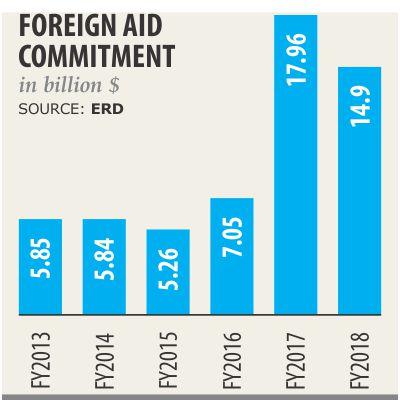Per capita debt crosses $200

Bangladesh's per capital external debt now stands at $204.85 thanks to the large loans the government has taken from China and Russia for some transformational projects.
In fiscal 2016-17 the per capita debt was $177.12, according to the Economic Relations Division.
“Bangladesh's external debt situation is still in the risk-free zone,” said an ERD official, adding that there is no threshold for per capita debt.
The comments came at a workshop for journalists on the information management system, organised by the ERD yesterday at the Bangabandhu International Conference Centre (BICC).
At the workshop the ERD gave a presentation on Bangladesh's aid scenario. As of June 2018, the total outstanding external debt stood at $33,520 million.
In the last five years, especially in the last two years, huge foreign aid commitment was received, which led to the spike in outstanding debt and per capita debt.
During the period, bilateral and multilateral development partners have committed $50.7 billion, which is 1.3 times higher than in the previous five years.
In fiscal 2016-17 the commitment was $17.96 billion and in the following year $14.90 billion.
As the commitment increased, the amount of unused foreign aid in the pipeline also shot up.
In the last fiscal year, unused foreign aid in the pipeline was $44.31 billion, of which 68.53 percent was from fiscal 2016-17 and fiscal 2017-18.
The composition of the pipeline aid is dynamic rather than static, according to the ERD presentation. The disbursement of aid from existing pipeline and piling up of new aid into the pipeline are going on simultaneously.
In this context it could be argued that the size of the current aid amount in the pipeline is not abnormally high.
Rather, it augurs well for timely and effective disbursement of aid in future in the priority sectors.
Previously, a report showed that foreign aid utilisation is delayed due to procurement and recruitment issues. “If the projects are delayed the project cost also goes up,” said ERD Secretary Monowar Ahmed, who inaugurated the workshop.
The ERD has already taken several steps for speedy implementation of the projects.
If the foreign aid implementation is delayed, a commitment charge has to be paid to the development partner. To make the project directors more accountable, the ERD will make recommendations to the government.
They are also taking initiatives to make the ERD more time befitting, he added.
